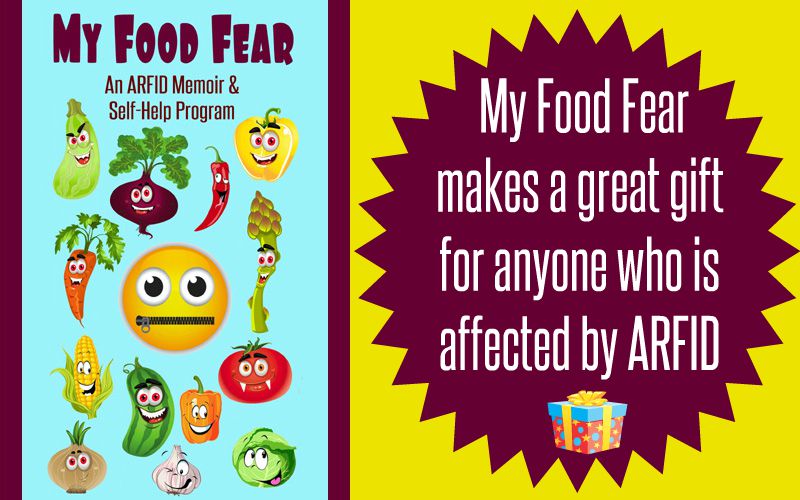What types of food fear prohibitions are ruling your life? What things do you feel that you simply can not do? Is your life restricted due to your food phobias and peculiar eating preferences? If you have ARFID, I can guarantee that the answer to all of these questions is “Yes”.
There are many questions that I can pose to you regarding your eating habits:
- Can you socialize and eat?
- How do you feel about yourself when it comes to eating?
- Is your diet providing you with the basic nutrition that your mind and body need?
If I know you, you are suffering in many ways from your selective eating, even if you are not consciously aware of all of the consequences on your life. I suffered myself for decades with extreme food phobia and selective eating, despite my lack of desire and complete inability to change myself and my habits. In fact, the passage of time has proven to me just how much suffering I did endure as a child, young man and mature adult, especially psychologically and socially.
This post explores the prohibitions that selective eaters place on themselves and the consequences they suffer if they have to break their habits.
What are Food Fear Prohibitions?
Prohibitions are things that can not be done, actions that can not be performed. We face many prohibitions during our lifetime, but when it comes to selective eating, these rules are self-imposed and self-enforced. We are, in effect, our own judge, jury and executioner in this regard…
Prohibitions are much more than mere preferences. Everyone has eating preferences. Prohibitions are rules set in stone. They are compulsions. They create behavioral imperatives that govern our lives continuously, since eating is such a common ritual that we do each and every day several times.
As avoidant/restrictive eaters, we rarely take the time to consider all of our self-created prohibitions, nor the consequences they have on our lives. If we did, we would cause ourselves great psychoemotional turmoil and possibly view ourselves as being different and damaged compared to the people who eat normally. Therefore, we tend to accept our prohibitions subconsciously and simply acquiesce to them consciously without much fight. In essence, we do not want to fight them. We simply want people to leave us alone with our self-imposed rules and allow us to live as we see fit, even though we probably know deep inside that our eating habits are isolating, very limiting and potentially unhealthy.
Examples of Common ARFID Limitations
Let’s explore some of the endless possible prohibitions which are self-imposed by people suffering from avoidant restrictive food intake disorder (ARFID):
People might eat a diet consisting of a very limited selection of food items. This can cause serious health consequences in some instances.
People might feel they are unable to dine out or eat in any social settings due to their selective eating. This can have wide-ranging social consequences.
People might never try new foods and may be extremely food neophobic. This leads most selective eaters to never expand their food options over many years of life.
People might not travel due to the inability to eat foods that are unknown or ethnic in origin. Since travel is a major facilitator of personal growth, selective eaters are deprived of such amazing opportunities to see the world.
People might refrain from family gatherings, including holiday celebrations, due to discomfort over pressure and ridicule from family members regarding their eating habits.
The list of possible prohibitions related to ARFID is virtually endless…
Consequences of Breaking Food Fear Prohibitions
What if a person decides to try and break with their self-imposed limitations on eating? What effects will occur?
Since these are not mere preferences, but instead are actual rules governing behavior, the consequences can be severe:
Some people will suffer physical illness upon trying to break their normal eating habits. Gagging, nauseam vomiting and diarrhea are all typical reactions in these circumstances. Others will fall short of such extreme expressions, but might still feel sick to some degree. People with very severe ARFID might feel these same effects even when simply being exposed to “undesirable” foods, even if someone else is eating the items.
Some people will suffer repeated conflict with friends or family members over their eating habits. These conflicts often occur when a person breaks with a behavioral limitation and tries to eat socially with this person. Arguments and sometimes physical violence might result. ARFID has ruined many close relationships, including family, work-related, friendships and even romantic bonds.
Occasionally (and wonderfully) an ARFID sufferer will break their usual habits and actually try a food that seems new or distasteful. Sometimes, they might find the new food item pleasing after trying it. Recalling these rare occurrences can be very helpful for people who eventually do want to get help in the form of treatment or self-treatment for ARFID.


